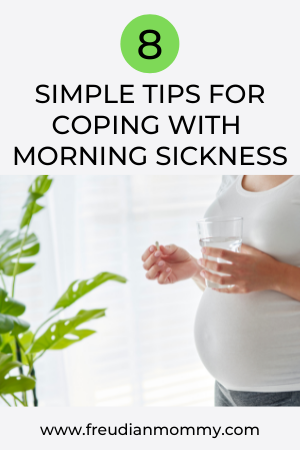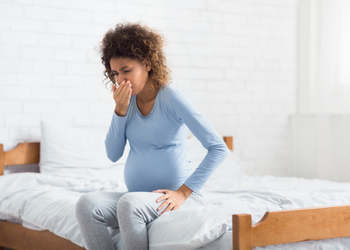Pregnancy is a beautiful experience for most mamas-to-be. However, the misery of morning sickness can overshadow this beautiful experience, especially if you have morning sickness throughout your entire pregnancy. But, the truth is, there is no way around it. It is one of the worst parts of pregnancy that we must learn to cope with safely.
Approximately 7 out of 10 women experience morning sickness, particularly during the first three months of pregnancy. It is a typical but miserable part of pregnancy that all pregnant women wish would go away!
And although we cannot make pregnancy morning sickness go away completely, there are hacks you can use to reduce the frequency and severity of morning sickness, specifically during the beginning stages of pregnancy.
Also read: Why is Prenatal Care Important? 6 Reasons to Seek Prenatal Care Throughout Pregnancy

What is morning sickness during pregnancy?
Morning sickness is when you are nauseous or feel sick to your stomach and vomiting during pregnancy. And although called morning sickness, pregnancy morning sickness can be experienced at any time, during the day or night.
Morning sickness, when does it start?
Morning sickness typically starts around six weeks of pregnancy and peaks roughly between week 6 and week 18 of pregnancy.
Although most of us pregnant mamas-to-be will feel better by the second trimester, some of us may have morning sickness throughout our entire pregnancy (yikes!).
Also read: First Trimester Checklist: 21 Key Things To Do in the First Trimester of Pregnancy
Why is my morning sickness so bad in the morning?

If you’re wondering, when is morning sickness the worst? The answer is in the morning. You’ll probably notice that eating anything in the mornings is challenging without feeling sick. Aside from the increased pregnancy hormones, pregnancy morning sickness may be due to low blood sugar when you first wake up.
*This post contains affiliate links, at no additional cost to you I am compensated if you purchase after clicking on the links.
Why do pregnant women have morning sickness?
There is no definitive answer for the cause of morning sickness, but pregnancy morning sickness can be due to an increase in pregnancy hormones and low blood sugar.
Did you also know that pregnancy morning sickness can be a benefit happening for both mother and child?
Also read: The Best Natural Cold Remedies For Pregnancy
According to Biologists at Cornell University, as crazy as this may sound, “morning sickness protects both mother and their unborn baby from foodborne illness and shield the fetus from chemicals that can deform fetal organs at the most crucial time in development.”
That is why morning sickness peaks between 6-18 weeks of pregnancy when organ development in the fetus is most sensitive to chemical disruption.
This study from Cornell helps clarify why many pregnant women develop an aversion to potentially harmful foods such as meats, certain vegetables, and caffeinated beverages and desire bland tasting foods in early pregnancy.
Pregnancy, morning sickness, and food aversion are also the body’s way of maintaining the health of the mother-to-be at a time when her immune system is inherently suppressed and has reduced abilities to fight off foodborne pathogens.
8 Pregnancy Sickness Hacks to Overcome Morning Sickness Misery!
1) Take your prenatal vitamins with food
Some prenatal vitamins are harder to swallow than others, but taking them with food will help keep them down and prevent nausea and vomiting. Also, if you find that taking the prenatal vitamins in the morning makes you more nauseous, changing the time you take them could make a difference.
2) Avoid an empty stomach
The key to reducing morning sickness is to always have savory snacks like saltine crackers on hand, particularly in the morning when you are most likely to have pregnancy morning sickness.
3) Find foods that work for you

The first trimester of pregnancy is difficult because your body is adjusting to pregnancy hormones and making unpleasant changes to your body. For instance, your taste buds and overcoming the smell of certain foods are two hurdles you’ll have to cope with, but finding foods that work for you will help with nausea.
For me, it was chicken caesar salad. I had to have it every day and sometimes even a couple of times a day. It almost seems like that was the only thing I could tolerate to keep down.
Similarly, I loved certain foods and drinks before pregnancy, but they left an awful taste in my mouth while pregnant. And the weird taste would trigger nausea and vomiting. As a result, I avoided those foods altogether, which made a huge difference.
4) Avoid triggers
Certain smells will also become triggers. If the smell of hotdogs makes you nauseous, avoiding that smell will more than likely save you an extra trip to the bathroom.
5) Get plenty of rest
6) Ginger could be your best friend
I had different phases in my pregnancy where I turned to ginger ale and ginger tea for comfort and other times when I was not too fond of it. Nonetheless, it is helpful and helps your stomach to settle.
7) Eat 5-6 small meals throughout the day:
Instead of 3 big meals: Eating a large meal after not eating for a while will send you straight to the bathroom vomiting. That’s what happened to me multiple times during my third pregnancy. I learned that eating small meals was more practical and tolerable throughout the day.
8) Try different morning sickness and anti-nausea products
here are many different morning sickness and anti-nausea products out there. In trying these nausea relief products, you could find one that helps relieve your morning sickness. Below are three anti-nausea products that are popular and highly recommended.
Final Thoughts on How to Overcome Morning Sickness Misery With These 8 Pregnancy Sickness Hacks!
Morning sickness can make you feel miserable, particularly in the first trimester, but finding hacks to help reduce and alleviate the symptoms of nausea and vomiting is the best thing you can do to cope with this incredibly challenging part of pregnancy.
And remember that if none of these hacks work for you, reach out to your medical provider, so they can prescribe you with anti-nausea medications if you need them because moderate to severe morning sickness can lead to dehydration.
Communicating and planning with your medical provider will ensure that your morning sickness is not bad enough that it is causing dehydration.
Related articles:
The Best Candies That Help With Morning Sickness
5 Exciting Benefits of Having Children
25 Things To Do Before Baby Arrives













